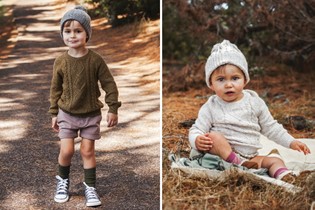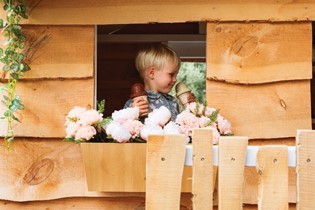Developing your child's sense of self control

Self-control in childhood is a good indicator of future success. Fortunately, it’s a skill we can help our kids develop and practise, explains Dr Melanie Woodfield.
Just control yourself!” Whether you mutter these words in frustration to a preschooler or have them taped to the bathroom mirror as a note-to-self after one too many treats, we all know that actually having self-control is something that’s easier said than done. As parents, we often get frustrated with young children’s impulsiveness and constant need for immediate gratification. We worry their lack of self-control could adversely affect them later on. Well, research does show a link between self-control and success, but fear not – it’s a trait that can be learned and developed at any age.
Self-control is an umbrella term that often includes things like being able to wait for something desirable (delaying gratification), but also other important skills like being conscientious, persevering with tasks, controlling impulses, regulating emotions and executive functioning (‘higher order’ thinking, such as planning and problem-solving). Self-control is thought to be a product of both nature and nurture, and usually develops gradually throughout childhood and into adulthood.
Kids with self-control difficulties might have frequent mood swings, poor tolerance of frustration or disappointment, a short attention span, trouble persisting with a task, be easily distracted, have poor impulse control, be hyperactive and have a hard time waiting their turn. Now, if you’re reading that list and thinking “Yes… tick… absolutely…” about a child you know, remember that many of these difficulties are par for the course in typically developing young children. And also remember that you can have too much of a good thing. Too much self-control might lead to being rigid and inflexible.
PUTTING IT IN CONTEXT
Self-control isn’t something you achieve and then have forevermore (if only!). While we may think in absolutes (“I have absolutely no self-control!” after gobbling an entire packet of biscuits), self-control is actually much more complex than this. We all display some self-control, some of the time, but context is important. For example, most of us wouldn’t eat a biscuit if it fell into a rubbish bin full of rotten meat. And while they may occasionally bite a peer at preschool, most young children probably wouldn’t bite their favourite teacher as she handed them
a treat. Also, it’s harder to show self-control if you’re tired or stressed, or have had a glass of wine or two. Many of us are able to show more ‘willpower’ or self-control in social situations, perhaps eating two chips at the shared morning tea rather than the whole packet that might disappear at home. And, if no one sees us do something, and/or it feels like there’s no victim (or the victim is a large, impersonal corporation), we’re more likely to take that stapler home from work.

Studies into online flaming and trolling are now exploring the role of self-control, and testing the idea that being nasty online isn’t necessarily because you can’t control yourself but because you haven’t realised that the situation required self-control in the first place. So there’s a part of us that needs to realise, “Woah, okay, I need to manage my urge here”. Interesting stuff.
IRRESISTIBLE MARSHMALLOWS
Remember the classic marshmallow test? Well, the first study of delayed gratification in children didn’t actually use marshmallows. Instead, Dr Walter Mischel and colleagues popped pretzel sticks and animal crackers on the menu at Stanford University’s kindergarten in the 1970s (marshmallows appeared in different variations of the experiment over the following decades). The series of experiments involved telling children aged three to six that they could have a little treat now, or more of the treat if they waited while the adult left the room and then returned. The children were followed up many years later, and researchers found that those able to wait and delay their gratification tended to do better in life.
But controversy has wafted around the marshmallow studies. In recent years this has been fueled by the findings of a group of researchers led by Dr Tyler Watts, who set out to repeat the experiment but with much larger groups of children (the original involved around 30 kids), and with children from different socioeconomic backgrounds (most children at the original kindy were from affluent backgrounds). Interestingly, while the larger study did show a similar pattern – that kids who could wait tended to do better later in life – the finding was much weaker. And when they ironed out the differences between children’s financial backgrounds, the effect was even more weak. It seemed that children from affluent families were more likely to be able to wait and delay gratification. This makes a lot of sense – in families where treats are rare and might not come again for a while, children are more likely to gobble them quickly.
Professor Terrie Moffitt and her colleagues from Dunedin’s longitudinal study followed children from birth into adulthood, paying close attention to self-control. They agree that the self-control situation is complex, and lots of factors feed in to our success and wellbeing as an adult. But they continue to advocate that self-control is a key player, and that having it in childhood can predict all sorts of outcomes in adulthood1 (though they do point out that success in life means different things to different people).
PRACTISING SELF-CONTROL
The good news is that self-control, like many skills, is like a muscle that can be strengthened. While it’s a set of skills that can be enhanced, some situations will still remain challenging (aka tempting). Also, some children are more sensitive and easily overwhelmed and/or triggered into actions they might later regret. Some children face stress more often in their little lives. These tips remain relevant in those situations – parents might just need more structure, patience, lots of repetition and gentle prompting to help their children learn.
🤍 Teach (and model) briefly waiting for things or delaying gratification. Parents often think they have to jump to attention when a child announces a need. Sure, if a toddler says they need to go to the toilet, jump! But a young child who announces “I’m hungry!” can wait for a short time before receiving a snack (“You can have your apple when I’ve finished changing your brother’s nappy and washed my hands”). Another way of delaying gratification could be to buy a treat, but explain that it can only be eaten after lunch. Kids can join in the fun of anticipating their upcoming treat (“Oooh that icing is going to taste so yummy!”). This can be useful for several reasons: alongside practising self-control, research into happiness suggests that anticipating things can help us enjoy them more.
🤍 Labelling feelings helps develop a child’s ability to express their emotions, rather than acting out (“You’re feeling angry that you can’t have it”). Over time, children will start to make use of this language and might be more likely to talk about how they’re feeling instead of ‘losing control’. When children are given permission to feel the way they feel, this validates their experience. They’re not necessarily being validated for their actions!
🤍 Teaching and modelling how to calm down is really useful when a child is eager or agitated. Basic relaxation strategies, like slow, deep breathing, can help. Perhaps breathing out slowly as though you were blowing out ten candles on a cake, or breathing out like you’re slowly blowing bubbles in a milkshake through a straw. Talking out loud in front of your children about your own ways to manage urges is helpful too: “I’m so tempted to eat that cake now instead of after dinner. I think I’ll move it to the back of the fridge so I don’t see it every time I walk into the kitchen”.
🤍 Encouraging problem-solving skills, and allowing a little frustration for your child (rather than solving things for them, or making everything okay immediately), is helpful for their ability to tolerate disappointment and frustration (“It looks like you’re struggling to make the base of the tower strong. I wonder what size bricks will be the strongest?”).
🤍 Taking others’ perspectives (“Your sister is sad because it’s raining and she can’t play outside today, and you are happy because you wanted to stay home”) can help encourage empathy and the ability to regulate emotions. Even if Junior then replies with, “Yes, but she…”
🤍 Delaying gratification by saving towards a goal can be useful for slightly older children. Pocket money can be divided into thirds – some to spend now, some to save, and some to give away or use to buy something for someone else (if that fits with your family values).
🤍 For older kids, learning another language or how to play a musical instrument can help. The gratification is delayed as it’s often unrewarding at the start, but becomes more enjoyable as skills develop. The potential advantages of this need to be balanced with the cost and time commitment, as well as the child’s readiness.
If your children are already at school and you didn’t set time aside each day to shape up their self-control when they were preschoolers, don’t panic! Remember, most learning for young children happens organically. They soak up information and awareness from their world, rather than learning it through formal lessons. And, most importantly, success in life means many different things to different people. Academic and/or career success doesn’t necessarily lead to social and emotional wellbeing. For many, being content, connected and healthy is more than enough.
Dr Melanie Woodfield is a child and adolescent clinical psychologist and researcher who lives in Auckland with her family. She continues to work on her ability to save the treat until after dinner.
1. See https://dunedinstudy.otago.ac.nz/files/1571970023782.pdf.

AS FEATURED IN ISSUE 49 OF OHbaby! MAGAZINE. CHECK OUT OTHER ARTICLES IN THIS ISSUE BELOW

















